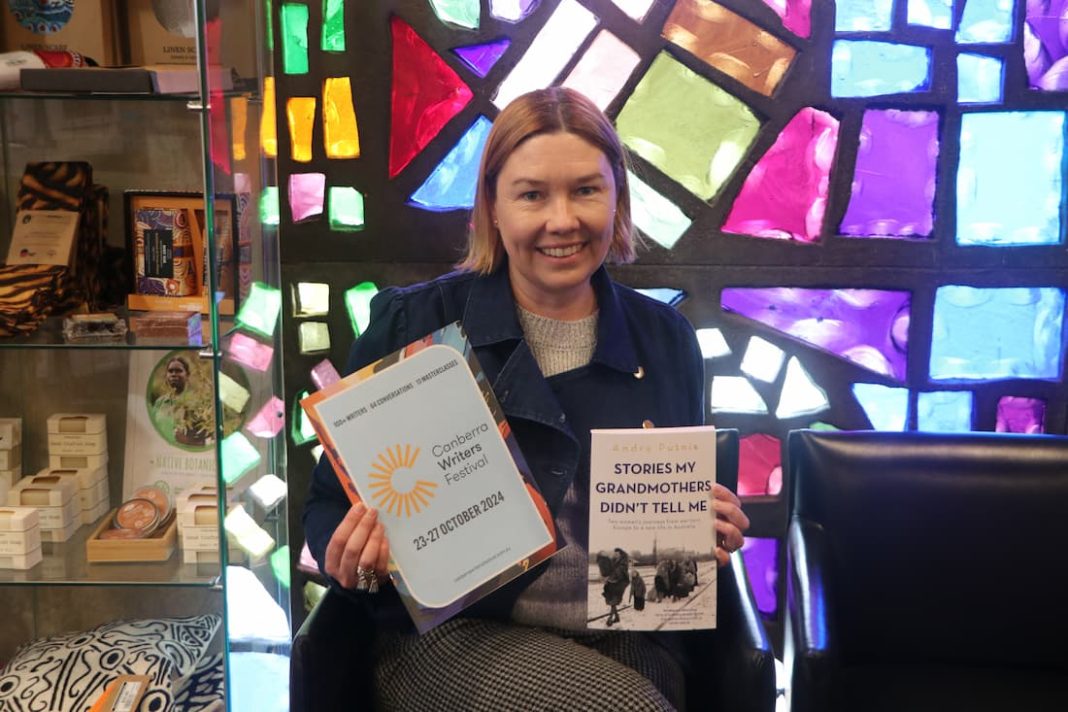Taking part in a writer’s festival in her hometown of Canberra is like being a “kid in a lolly shop”, says first-time author Andra Putnis.
Her debut novel, Stories My Grandmothers Didn’t Tell Me: Two women’s journeys from war-torn Europe to a new life in Australia, was released in July.
The book delves into the secret lives of her grandmothers, Aline and Milda, during the Soviet and Nazi occupations of Latvia in World War II.
Ms Putnis will speak about her story alongside Sydney author Tess Scholfield-Peters at the Canberra Writers Festival event, The Edge of Forgetting, at the National Library of Australia on 26 October.
“We’ll be talking about the hidden secrets within families, migration, war and loss and the perils of writing a family history book,” she said.
“I think a lot of people have a sense they have hidden stories in their families – and my sense is that most families, of course people’s parents or grandparents are from all over the world or they’re indigenous to Australia, have huge family stories.
“It’s the sense that people have hidden stories in plain sight – I think a lot of people can relate to that.”
She said it was exciting to take part in an event at home.
“I feel a little bit like a kid in a lolly shop, in that I can see all of these incredible writers on the program like Tim Winton and Markus Zusak and Melissa Lucashenko,” Ms Putnis said.
Ms Putnis first started exploring her family history in her late twenties.
In 2006 she had a conversation with her grandmother Aline, who opened up about her past.
“That got me started and she was a master storyteller,” Ms Putnis said.
For the next 18 years, she researched the history and visited Latvia to interview family members.
She said that while there was some angst within the family about sharing their story, they understood, given the time and effort she put into the book, that it was “coming from a place of love”.
“It took a long time because I started with a bit of a bang and I got quite a long way into it, but I did become a bit intimidated by the magnitude of the story,” Ms Putnis said.
“My grandmothers survived the Soviet Nazi occupations of Latvia, then it was reoccupied and became the USSR (Union of Soviet Socialist Republics) and (they) came through displaced persons camps to Australia.”
“Just the magnitude of the stories and what they witnessed; it was a pretty intimidating subject matter.
“A few times I put it down because I thought I ‘m not sure I can do these stories justice, and I’m also concerned I’m opening up a bit of trauma in my family.”
Ms Putnis said if she didn’t follow through, it would be a regret she carried to her deathbed.
“So, I kept picking it up and eventually I had my own two children, and it came to a point in my life where it was now or never,” she said.
The part-time writer completed a Bachelor of Arts/Law at the Australian National University majoring in History in 2001.
Ms Putnis has worked as a policy analyst, and in senior roles with the Australian Government.
She is currently undertaking a Masters of Culture, Health and Medicine, specialising in qualitative research and storytelling, through the ANU.
Canberra Daily is keen to hear from you about a story idea in the Canberra and surrounding region. Click here to submit a news tip.



